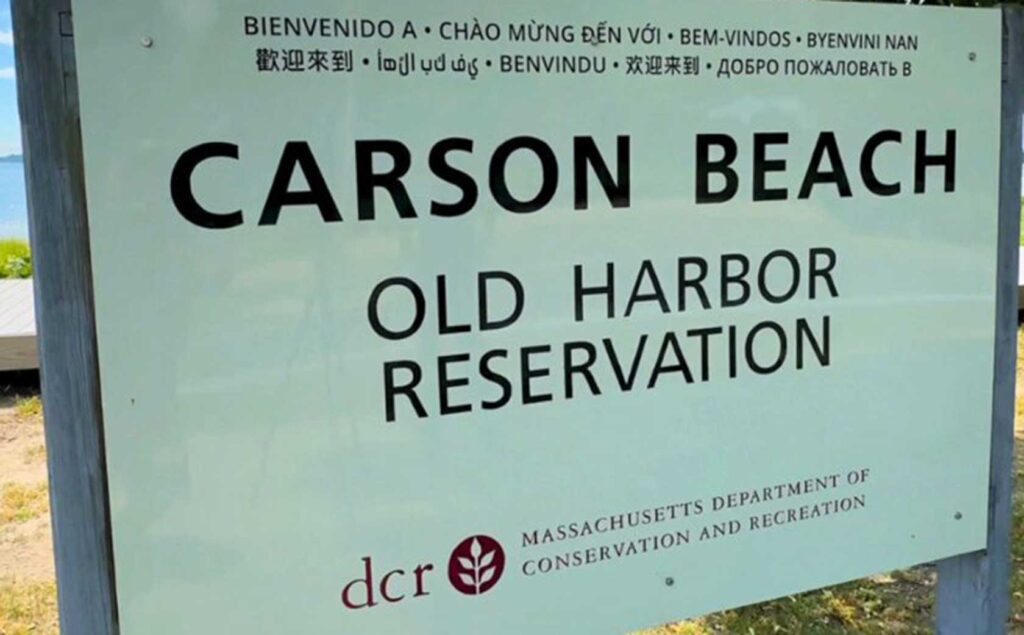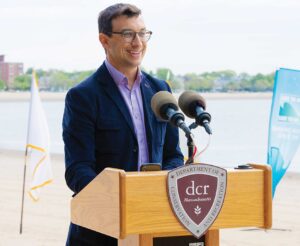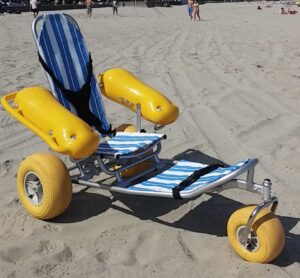New multilingual signage aims to increase inclusive access at state beaches
Effort is part of broader goal to diversify outdoor recreation across the state

A new state push aims to welcome more visitors to Boston area beaches with new multilingual signage.
Under the new effort, signs at metropolitan beaches — the 15 state-owned beaches in the Boston area — will welcome visitors to the beach in nine different languages, including Spanish, Portuguese, Haitian Creole and Cape Verdean Creole.
Water safety signs at the beaches include a QR code, which links to the same information in all nine languages.
The 15 beaches mark the start of the effort, which will eventually include similar greetings for visitors at all state-owned waterfronts across the state, both coastal and inland.
“As summers get hotter, it is critical for all of our residents and all of our families across the Commonwealth to have access and feel welcome at our waterfronts,” said Brian Arrigo, commissioner of the Massachusetts Department of Conservation and Recreation. “Something as simple as signage goes such a long way towards that.”
Across the region, better language access along the waterfront has been identified as a priority among communities.
The 2023 “Breaking Barriers” report from the Metropolitan Beaches Commission identified multilingual signage as a top recommendation at its beaches.

Chris Mancini, executive director of Save the Harbor/Save the Bay. Save the Harbor/Save the Bay partnered with DCR to implement the new inclusive signage. PHOTO: Katy Rogers
“We heard directly from hundreds of people. The idea is that it’s both a symbolic and an actual gesture,” said Chris Mancini, executive director of Save the Harbor/Save the Bay, which partnered with the state on the effort. “The fact is that when you go to a beach now, in nine different languages that use multiple different alphabets, there is lettering on the beach that regardless of what background you’re from or what language you speak, you’re going to see something that is a strong, clear indicator that anyone is welcome here.”
Language access can be key to helping people know how to — and want to — interact in outdoor spaces, said Laila Pearson, the community engagement coordinator at The American City Coalition, a Roxbury-based nonprofit that runs the Waterways program, an effort to connect more residents from communities of color with waterfront spaces in the city.
“We know that this is one of the things that can make people feel like, one, they know what to do in a space, but two, that they’re included and involved in it,” Pearson said. “Even if some of the things might be more transparent or obvious or kind of common-sense, just to remind you that we want you to be here and we know that you are here is what that signage can do.”
Staff at The American City Coalition said they would like to see continued engagement from the state to address barriers beyond language access.
“We think that deeper engagement is important, because if this is one barrier, we’re sure, through our research, that there are many other barriers that go beyond just the waterfronts, that go beyond just the beaches, that go beyond the pools,” said Willie Bodrick II, president and CEO of the coalition.
The group’s Waterways program does its own work to close access gaps, including efforts to increase awareness about what waterfront resources exist and running public programming to connect residents to those resources.
The new signage comes after years of delay to increase language access at state beaches. Former acting DCR Commissioner Stephanie Cooper first signaled the multilingual signage would be rolled out in 2022.
In a state with over 1,500 miles of shoreline, waterfront access is an important resource, even as, historically, some communities have been left out.
As part of a five-year state survey of outdoor recreation activities released last year, activities like visiting the beach and swimming in outdoor pools or natural bodies of water ranked within the top 10 most popular outdoor recreation activities in the state.
“Everyone loves a day at the beach,” Arrigo said. “We want to make sure it’s a great memory people are making when they’re on our properties, and to be able to do that takes a lot of great effort.”
Hotter summers coming
That effort is increasingly important as summers get hotter due to climate change, said Cooper, who now serves as the state’s undersecretary for the environment at the Executive Office of Energy and Environmental Affairs.
“There’s something viscerally wonderful in a way about cooling off in the water,” she said. “We know that that’s important and we know that it’s one of the many things that makes Massachusetts so special. That’s why we’re so excited about investing in all of our waterfronts.”
The state has seen changing temperatures impact how it runs its waterfronts and pools. Arrigo said the state opened a number of DCR pools a few days early this year due to a heat wave, and opened wading pools a couple of weeks early.
The welcome signs are only part of the DCR’s push in an effort that isn’t limited to signage at beaches. Arrigo said the department is also focused on expanding language access in educational materials, guided tours at state parks and beaches, and interpreters at public meetings.
Language access efforts have also included hiring practices, with a specific effort to hire multilingual lifeguards and water safety staff at waterfronts and pools.
“We’re really creating inclusive and enriching experiences and memories for people, and we’re doing that in a way that everybody can experience the beauty that is all across the Commonwealth,” Arrigo said. “The signs are obviously important, but we’re taking a multifaceted approach to committing ourselves to providing welcoming and inclusive spaces.”
Improving physical accessibility

Floating beach wheelchairs have three wheels, back and leg support, and floats under the arm rests. PHOTO: Mass DCR
The state efforts are also focused on making the beaches more physically accessible. Through the Universal Access Program, a DCR initiative to make outdoor recreation available for people of different ability levels, the state purchased $300,000 in new equipment to make beach visits more accessible.
Those investments include beach wheelchairs — which are designed to travel over sand and may include flotation to go into the water in calm conditions — and beach mats — which can be put over sand to allow for increased mobility.
“Those are smaller investments but go such a long way in terms of providing access and making sure that we’re creating spaces for everybody of all abilities,” Arrigo said.
Diversifying water access
All those elements come as part of a broader goal to diversify outdoor recreation in the state, an effort spearheaded by the Massachusetts Office of Outdoor Recreation, which was formed in 2022 and aims to bolster that industry in the state, including by making opportunities more diverse and inclusive.
“I think that what DCR is doing is really a model for other folks around the state,” said Paul Jahnige, who heads that office. “My office gets to work in collaboration across state government, but also with many of our private partners. Highlighting these opportunities for expanding language access and making spaces feel more welcoming to the different audiences who haven’t always felt welcome is really critical to that.”
Already, the Office of Outdoor Recreation has taken some steps to support inclusivity in water sports. As part of a grant opportunity in April, the office provided $167,000 in funding to events and programming to make waterfront activities more welcoming. Of the 21 recipients, 14 were focused on water-related activities.
He said another round of that grant funding should be made available within the next month.
“I think, unfortunately, water access is not always open to everybody, and everybody doesn’t feel welcome,” Jahnige said. “That’s why these kinds of efforts are so important, whether it’s paddling, or surfing, or beach access, or river access, or access to pools or spray decks.”






